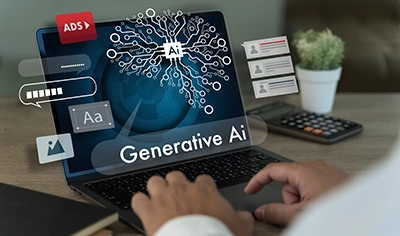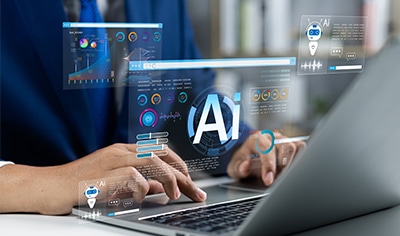Artificial Intelligence (AI) is present everywhere and becoming more sophisticated at doing what humans do, with better efficiency, improved productivity, and reduced costs. This emerging technology has brought a paradigm shift in almost every vertical, and healthcare is no exception. AI in healthcare has become a transformational force as it empowers health practitioners to simplify complex procedures, improve operational efficiencies, and streamline administrative & routine tasks. This, in turn, paves the way for enhanced patient care and reduced burnout.
Leading tech giants are investing heavily in AI healthcare innovations since healthcare is one of the fastest-growing industries. For instance, Microsoft announced a whopping $40 million, five-year program to address some of the toughest healthcare challenges by leveraging the potential of AI. Furthermore, global AI spending in healthcare is estimated to grow from 15.4 billion USD in 2022 to 208.2 billion in 2030 at a compound annual growth rate (CAGR) of 38.4% during 2022-2030. This indicates that use of AI in healthcare has an unmatched potential to disrupt the industry.
Though AI adoption in healthcare is still at its nascent stage, let’s discover how AI-powered recommendation engines can be helpful for both health practitioners and patients when applied in the following areas – clinical decision-making, accelerated drug development, reduce physicians stress, remote monitoring, improved patient care, robot-assisted surgery, and more. Let’s dig deeper into it.
AI in Healthcare: 5 Key Benefits of AI-Powered Recommendation Engines
1. Clinical Decision Making
In the healthcare sector, the benefits of AI in medicine and healthcare are well documented. Introducing AI-powered recommendation engines in certain healthcare processes can be helpful in clinical decision-making. Thanks to their unmatched potential to provide health practitioners with real-time data to examine and diagnose patients, identify risk exponentially faster, plan treatments, and reduce diagnostic errors. What’s more interesting about AI-enabled recommendation solutions is that they can collate and comb through large volumes of clinical data to provide health practitioners with a holistic view of the patient’s health status to drive better care outcomes.
2. Accelerated Drug Discovery and Development
The traditional ways of discovering and developing new therapeutics are prohibitively expensive and time-intensive. On average, the research and development (R&D) for a new drug may cost $1–3 billion and take about 10-15 years. Fortunately, recommendation engines powered by emerging technologies like AI promise to reduce drug development costs and timelines by eliminating the guesswork involved in the R&D stage. This could be the reason why many leading pharma companies are betting on these advanced solutions for artificial intelligence in healthcare to beat the odds of drug discovery and development.
3. Reduce Physicians’ Stress and Burnout
According to research conducted by Stanford Medicine, Mayo Clinic, and the American Medical Association, physician burnout is at an all-time high. In fact, several studies reported that more than 60% of physicians feel stressed owing to a shortage of talented healthcare professionals, long working hours, deadline pressures, managing lots of administrative tasks, and other workplace conditions. Fortunately, with the help of recommendation engines, can ease the burden of healthcare professionals by streamlining procedures, optimizing workflows, automating manual processes, and organizing operations quickly.
4. Remote Monitoring
Connected healthcare devices are proven helpful in saving lives through real-time monitoring of critical events such as asthma attacks, heart attacks, etc. Remote monitoring devices, when coupled with AI-powered recommendation engines, leverage IoT networks for tracking activities in the human body, which in turn enables healthcare practitioners to make quick decisions. It is estimated that the market size for global remote patient monitoring systems will grow from 4.4 billion USD in 2022 to 16.9 billion USD in 2030.
5. Safer Surgeries
Use of artificial intelligence in healthcare is assisting surgeons in critical and complex surgeries that demand extreme care and accuracy. Using AI-Powered recommendation engines, healthcare practitioners get an enhanced level of dexterity to reach every minuscule space within the human body and operate with utmost precision that might otherwise require open surgery. In other words, AI-Powered recommendation engines enable healthcare professionals to perform complex surgical operations with reduced risk of infection, blood loss, post-surgery pain, etc.
Empowering Care Providers With Best Healthcare Industry Solutions
Challenges Associated With AI-Powered Recommendation Engines
Implementing AI-driven recommendation engines in healthcare comes with a set of challenges. Let’s take a look at some limitations of integrating AI-driven solutions into healthcare operations.
I. Talent Gap
There is a shortage of talented professionals leaving healthcare businesses impaired to leverage the potential of AI. On top of that, healthcare businesses are struggling to upskill their staff and make them well-versed with advanced solutions for AI in medicine and healthcare, such as recommendation engines. In order to realize the potential of AI, healthcare businesses need to look for ways to bridge the talent gap.
II. Large Volumes of Unstructured Data
Another common challenge in the healthcare industry is that it deals with large volumes of data. Though AI-enabled solutions are helpful in deriving actionable insights out of raw and unstructured data, the availability of large chunks of data can undermine the potential of AI. To overcome this challenge, healthcare businesses should devise an effective data management strategy coupled with a robust data platform.
The Future of AI-Powered Recommendation Engines in Healthcare
AI-Powered recommendation engines will continue to play a substantial role in healthcare. These AI-enabled solutions are already empowering health practitioners in accurate diagnosis, risk prediction, remote monitoring, robot-assisted surgery, predicting patient no-shows, and developing life-saving therapeutics in a quick turnaround time. It is believed that in the coming years, there is a lot yet to come from the collaboration of healthcare with AI-powered recommendation engines. As stated above, AI in healthcare is still in its infancy stage, and owing to this, treatment recommendations have proven challenging. However, AI-enabled solutions will eventually ace that domain as well.
The ongoing research and development in the use of AI in healthcare is expected to bring about groundbreaking innovations that will further improve the quality of patient care and outcomes. The ability of AI to analyze diverse datasets, including genetic information, allows for the development of personalized treatment plans. Customizing medical interventions based on particular patient characteristics and genetic profiles has the potential to greatly improve treatment efficacy and minimize adverse effects.
AI use in healthcare is promoting a collaborative healthcare ecosystem where researchers, healthcare professionals, and technology developers work synergistically. This approach is quickening the pace of medical discoveries, fostering knowledge sharing, and ultimately helping patients across the globe. AI is playing a crucial role in accelerating medical research by analyzing huge amounts of clinical trials, scientific literature, and real-world patient data. This expedites the identification of new treatment options, contributing to the development of innovative medications and therapies.
Summing Up
The demand for AI-enabled solutions has been rising with every passing year since each healthcare business is contemplating embracing advanced recommendation engines. If you are also looking for ways to realize the potential of artificial intelligence in medical diagnosis and in your healthcare business, you should consider partnering with a reliable tech partner that has rich prowess in developing HIPAA and GDPR-compliant recommendation engines. Damco is one such service provider, having proved its mettle in the Artificial Intelligence and Machine Learning Services specializing in developing solutions for the Healthcare Industry.






